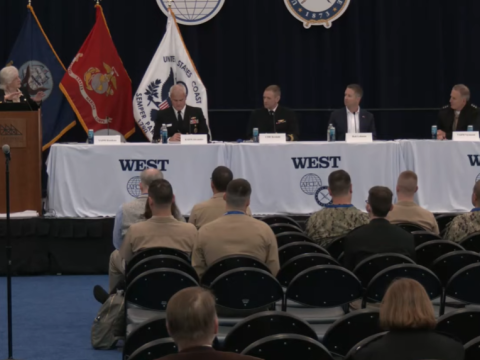On Point: Q&A with Rick Wagner
Q&A with Rick Wagner, corporate vice president for Microsoft Federal.
Q&A with Rick Wagner, corporate vice president for Microsoft Federal.
What will be the key new commercial technology that will be embraced by the federal government in the coming years?
Federal agencies, like organizations around the country, recognize that hybrid work environments are the new normal, especially as we continue to work to contain the COVID-19 pandemic. Hybrid work is complex, so embracing flexibility, different work styles and a culture of trust can help us all navigate it successfully. Enhanced remote collaboration and productivity tools can enable that flexibility and transition, and we will be there to support our federal partners [as they] embrace these tools to help them meet their mission in the years ahead.
How can government and industry overcome existing hurdles to partner in cybersecurity? Must it be commercial-centric or government-centric?
All of us, the public and private sectors alike, have a responsibility when it comes to securing critical infrastructure. A recent White House Summit on Cybersecurity, hosted by President Biden, brought together federal agencies and companies from a range of critical industries to discuss just that—how we can partner to enhance our collective security. I’m proud that Microsoft is committed to making significant investments to support enhancing cybersecurity of our products and services and to increase our collaboration with public sector agencies to ensure they have the tools and resources to reduce cyber threats.
Will the Internet of Things (IoT) become a major part of government IT activities?
For many agencies, leveraging IoT can help enable more automation and improve operational efficiencies. Cloud-enabled IoT can help agencies manage numerous assets, such as vehicle fleets, real estate across a wide geography and dispersed critical infrastructure components. A key consideration is securing IoT from cyber threats. Microsoft is making significant investments
to develop trusted platforms for connected devices so customers can rely on these devices wherever and whenever needed.
How will the military embrace 5G to meet future mission needs?
The Defense Department has noted that 5G is critical strategic technology to ensure advanced communications and ubiquitous connectivity across their missions. As the department moves to implement an enterprise cloud architecture, integrating its Joint All-Domain Command and Control effort across the branches, 5G will be critical to support these efforts and ensure that our service members remain connected and have access to real-time information at the farthest reaches of the world. Microsoft is partnering with the DOD to inform our cloud road map to bring 5G capabilities to both the edge locations and devices required.
What do you think is the next great information technology trend?
For the past couple of decades, we’ve all gotten used to long, complex passwords to log into our accounts. Needing to remember dozens of passwords is difficult and cumbersome. Weak passwords are easily targeted by malicious actors, resulting in 679 password attacks every second (more than 18 billion each year). Microsoft is leading a paradigm shift with account security by moving to a passwordless future. We recently announced the availability of passwordless sign in to Microsoft accounts for enterprise accounts. This move will enhance security of millions of users.
Rick Wagner leads Microsoft Federal as corporate vice president, supporting federal agencies of all sizes and scopes. Prior to joining Microsoft, Wagner was president of ManTech Mission,
Cyber & Intelligence Solutions (MCIS) Group.


Comments